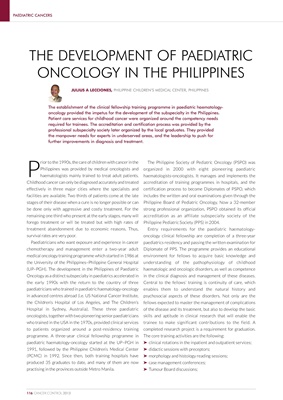
PAEDIATRIC CANCERS
THE DEVELOPMENT OF PAEDIATRIC
ONCOLOGY IN THE PHILIPPINES
JULIUS A LECCIONES, PHILIPPINE CHILDREN’S MEDICAL CENTER, PHILIPPINES
The establishment of the clinical fellowship training programme in paediatric haematology-
oncology provided the impetus for the development of the subspecialty in the Philippines.
Patient care services for childhood cancer were organized around the competency needs
required for trainees. The accreditation and certification process was provided by the
professional subspecialty society later organized by the local graduates. They provided
the manpower needs for experts in underserved areas, and the leadership to push for
further improvements in diagnosis and treatment.
P
rior to the 1990s, the care of children with cancer in the The Philippine Society of Pediatric Oncology (PSPO) was
Philippines was provided by medical oncologists and organized in 2000 with eight pioneering paediatric
haematologists mainly trained to treat adult patients. haematologists-oncologists. It manages and implements the
Childhood cancer can only be diagnosed accurately and treated accreditation of training programmes in hospitals, and the
effectively in three major cities where the specialists and certification process to become Diplomates of PSPO, which
facilities are available. Two thirds of patients come at the late includes the written and oral examinations given through the
stages of their disease when a cure is no longer possible or can Philippine Board of Pediatric Oncology. Now a 32-member
be done only with aggressive and costly treatment. For the strong professional organization, PSPO obtained its official
remaining one third who present at the early stages, many will accreditation as an affiliate subspecialty society of the
forego treatment or will be treated but with high rates of Philippine Pediatric Society (PPS) in 2004.
treatment abandonment due to economic reasons. Thus, Entry requirements for the paediatric haematology-
survival rates are very poor. oncology clinical fellowship are completion of a three-year
Paediatricians who want exposure and experience in cancer paediatrics residency and passing the written examination for
chemotherapy and management enter a two-year adult Diplomate of PPS. The programme provides an educational
medical oncology training programme which started in 1986 at environment for fellows to acquire basic knowledge and
the University of the Philippines–Philippine General Hospital understanding of the pathophysiology of childhood
(UP–PGH). The development in the Philippines of Paediatric haematologic and oncologic disorders, as well as competence
Oncology as a distinct subspecialty in paediatrics accelerated in in the clinical diagnosis and management of these diseases.
the early 1990s with the return to the country of three Central to the fellows’ training is continuity of care, which
paediatricians who trained in paediatric haematology-oncology enables them to understand the natural history and
in advanced centres abroad (i.e. US National Cancer Institute, psychosocial aspects of these disorders. Not only are the
the Children’s Hospital of Los Angeles, and The Children’s fellows expected to master the management of complications
Hospital in Sydney, Australia). These three paediatric of the disease and its treatment, but also to develop the basic
oncologists, together with two pioneering senior paediatricians skills and aptitude in clinical research that will enable the
who trained in the USA in the 1970s, provided clinical services trainee to make significant contributions to the field. A
to patients organized around a post-residency training completed research project is a requirement for graduation.
programme. A three-year clinical fellowship programme in The core training activities are the following:
paediatric haematology-oncology started at the UP–PGH in ‰ clinical rotations in the inpatient and outpatient services;
1991, followed by the Philippine Children’s Medical Center ‰ didactic sessions with preceptors;
(PCMC) in 1992. Since then, both training hospitals have ‰ morphology and histology reading sessions;
produced 35 graduates to date, and many of them are now ‰ case management conferences;
practising in the provinces outside Metro Manila. ‰ Tumour Board discussions;
116 CANCER CONTROL 2013